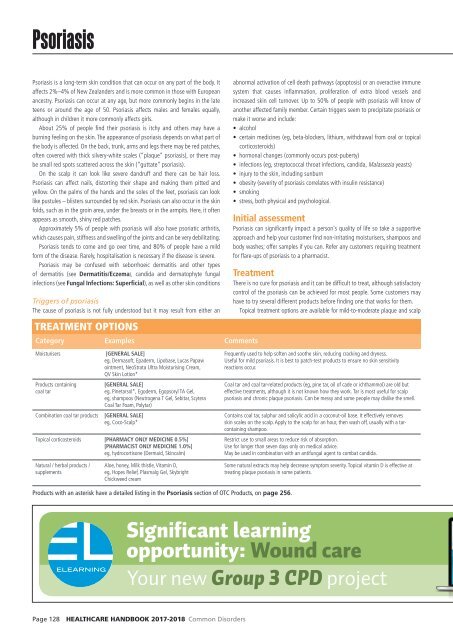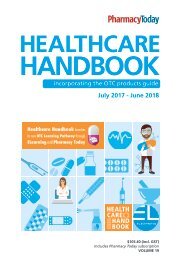2017 HCHB_digital
Create successful ePaper yourself
Turn your PDF publications into a flip-book with our unique Google optimized e-Paper software.
Psoriasis<br />
Psoriasis is a long-term skin condition that can occur on any part of the body. It<br />
affects 2%–4% of New Zealanders and is more common in those with European<br />
ancestry. Psoriasis can occur at any age, but more commonly begins in the late<br />
teens or around the age of 50. Psoriasis affects males and females equally,<br />
although in children it more commonly affects girls.<br />
About 25% of people find their psoriasis is itchy and others may have a<br />
burning feeling on the skin. The appearance of psoriasis depends on what part of<br />
the body is affected. On the back, trunk, arms and legs there may be red patches,<br />
often covered with thick silvery-white scales (“plaque” psoriasis), or there may<br />
be small red spots scattered across the skin (“guttate” psoriasis).<br />
On the scalp it can look like severe dandruff and there can be hair loss.<br />
Psoriasis can affect nails, distorting their shape and making them pitted and<br />
yellow. On the palms of the hands and the soles of the feet, psoriasis can look<br />
like pustules – blisters surrounded by red skin. Psoriasis can also occur in the skin<br />
folds, such as in the groin area, under the breasts or in the armpits. Here, it often<br />
appears as smooth, shiny red patches.<br />
Approximately 5% of people with psoriasis will also have psoriatic arthritis,<br />
which causes pain, stiffness and swelling of the joints and can be very debilitating.<br />
Psoriasis tends to come and go over time, and 80% of people have a mild<br />
form of the disease. Rarely, hospitalisation is necessary if the disease is severe.<br />
Psoriasis may be confused with seborrhoeic dermatitis and other types<br />
of dermatitis (see Dermatitis/Eczema), candida and dermatophyte fungal<br />
infections (see Fungal Infections: Superficial), as well as other skin conditions<br />
Triggers of psoriasis<br />
The cause of psoriasis is not fully understood but it may result from either an<br />
TREATMENT OPTIONS<br />
Category Examples Comments<br />
abnormal activation of cell death pathways (apoptosis) or an overactive immune<br />
system that causes inflammation, proliferation of extra blood vessels and<br />
increased skin cell turnover. Up to 50% of people with psoriasis will know of<br />
another affected family member. Certain triggers seem to precipitate psoriasis or<br />
make it worse and include:<br />
• alcohol<br />
• certain medicines (eg, beta-blockers, lithium, withdrawal from oral or topical<br />
corticosteroids)<br />
• hormonal changes (commonly occurs post-puberty)<br />
• infections (eg, streptococcal throat infections, candida, Malassezia yeasts)<br />
• injury to the skin, including sunburn<br />
• obesity (severity of psoriasis correlates with insulin resistance)<br />
• smoking<br />
• stress, both physical and psychological.<br />
Initial assessment<br />
Psoriasis can significantly impact a person's quality of life so take a supportive<br />
approach and help your customer find non-irritating moisturisers, shampoos and<br />
body washes; offer samples if you can. Refer any customers requiring treatment<br />
for flare-ups of psoriasis to a pharmacist.<br />
Treatment<br />
There is no cure for psoriasis and it can be difficult to treat, although satisfactory<br />
control of the psoriasis can be achieved for most people. Some customers may<br />
have to try several different products before finding one that works for them.<br />
Topical treatment options are available for mild-to-moderate plaque and scalp<br />
Moisturisers [GENERAL SALE]<br />
eg, Dermasoft, Epaderm, Lipobase, Lucas Papaw<br />
ointment, NeoStrata Ultra Moisturising Cream,<br />
QV Skin Lotion*<br />
Products containing<br />
coal tar<br />
Combination coal tar products<br />
[GENERAL SALE]<br />
eg, Pinetarsol*, Egoderm, Egopsoryl TA Gel,<br />
eg, shampoos (Neutrogena T Gel, Sebitar, Scytera<br />
Coal Tar Foam, Polytar)<br />
[GENERAL SALE]<br />
eg, Coco-Scalp*<br />
Topical corticosteroids [PHARMACY ONLY MEDICINE 0.5%]<br />
[PHARMACIST ONLY MEDICINE 1.0%]<br />
eg, hydrocortisone (Dermaid, Skincalm)<br />
Frequently used to help soften and soothe skin, reducing cracking and dryness.<br />
Useful for mild psoriasis. It is best to patch-test products to ensure no skin sensitivity<br />
reactions occur.<br />
Coal tar and coal tar-related products (eg, pine tar, oil of cade or ichthammol) are old but<br />
effective treatments, although it is not known how they work. Tar is most useful for scalp<br />
psoriasis and chronic plaque psoriasis. Can be messy and some people may dislike the smell.<br />
Contains coal tar, sulphur and salicylic acid in a coconut-oil base. It effectively removes<br />
skin scales on the scalp. Apply to the scalp for an hour, then wash off, usually with a tarcontaining<br />
shampoo.<br />
Restrict use to small areas to reduce risk of absorption.<br />
Use for longer than seven days only on medical advice.<br />
May be used in combination with an antifungal agent to combat candida.<br />
Natural / herbal products /<br />
supplements<br />
Aloe, honey, Milk thistle, Vitamin D,<br />
eg, Hopes Relief, Plasmalg Gel, Skybright<br />
Chickweed cream<br />
Some natural extracts may help decrease symptom severity. Topical vitamin D is effective at<br />
treating plaque psoriasis in some patients.<br />
Products with an asterisk have a detailed listing in the Psoriasis section of OTC Products, on page 256.<br />
Significant learning<br />
opportunity: Wound care<br />
Your new Group 3 CPD project<br />
Page 128 HEALTHCARE HANDBOOK <strong>2017</strong>-2018 Common Disorders



